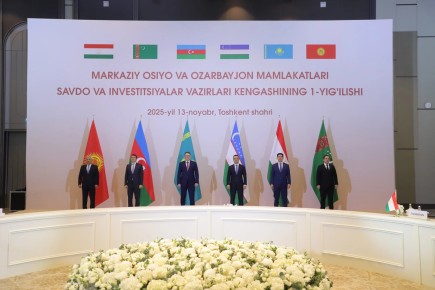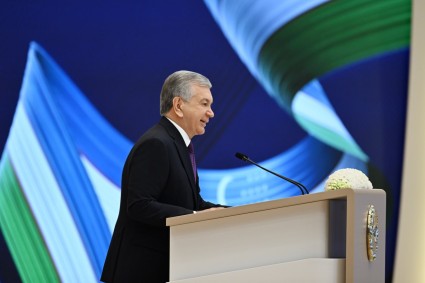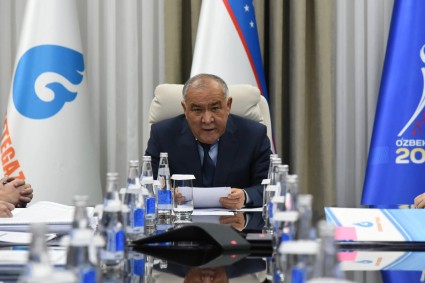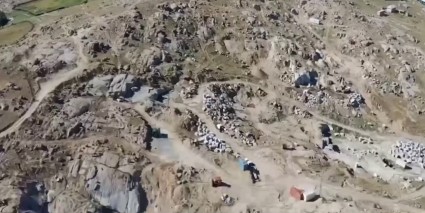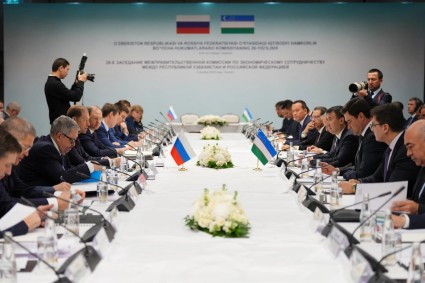Today, Tashkent hosted inaugural meeting of the Central Asian trade and investment ministers, joined by their Azerbaijani counterpart.
The Uzbek Minister of Investment, Industry, and Trade Laziz Kudratov opened the meeting with a proposal that sounded like an important vector for regional development:
"There is huge untapped potential for trade, especially given the complementarity of our economies and the growing business interest in joint projects. To this end, we propose developing a joint action plan to increase trade to $20 billion," Kudratov said.
Reportedly, trade between the region's countries doubled between 2017 and 2024, reaching approximately $11 billion. By Central Asian standards, this is obvious progress, but, as we see, insufficient.
As Kudratov underscored, the plan should include "the harmonization of customs procedures, implementing of digital document flow, the mutual recognition of permits, and the development of a one-stop system at borders." Specific steps include the creation of a unified electronic catalog of regional goods and manufacturers and the integration of digital platforms for chambers of commerce and industry, ministries, and export agencies.
"This will allow businesses to directly find suppliers and buyers, reducing transaction costs and dependence on intermediaries," the minister explained.
Another idea voiced by the Uzbek authorities is holding a Central Asia-Azerbaijan investment forum in Samarkand in 2026. The event is expected to unite regional business initiatives and could well serve as a platform for the presentation of the joint "Made in Central Asia" brand.
The minister underscored that producing products under a single regional brand should facilitate export growth and increase recognition of Central Asian goods in foreign markets.
The ideas have found a response from its counterparts. Kazakhstan's Minister of Trade and Integration, Arman Shakkaliyev, called on countries in the region to move from the "buy-sell" model to a more comprehensive "invest-produce-sell" system. According to him, Kazakhstan has already launched a new investment cycle focused on creating export-oriented production and sustainable value chains.
"To give impetus to this area, it is planned to sign an industrial cooperation development program with Uzbekistan, and certain elements of it may be extended to Central Asian countries and Azerbaijan," Shakkaliyev said.
Supporting the idea of вАЛвАЛcreating a common "Made in Central Asia" brand, the Kazakh minister proposed starting with a pilot project based on digital trading platforms.
Tajikistan's Minister of Economic Development and Trade, Zavqi Zavqizoda, focused on digitalization. He recalled that the Tajik startup Zypl.ai, which works in the field of artificial intelligence, is already present in 15 countries, including Uzbekistan and Kazakhstan. Another example, according to the Tajik side, is the fintech project Alif, which operates in Uzbekistan and Tajikistan and has quickly become one of the leaders in the digital payments and financial services market in the region.
"This striking example demonstrates that innovation in our region is capable of reaching the international level and creating its own high-tech brands," Zavqizoda underscored Tajikistan's efforts in this area.
Turkmenistan's Minister of Trade and Foreign Economic Relations, Nazar Agakhanov, stated that simplifying trade procedures and developing electronic platforms "will be key steps toward achieving common goals." Ashgabat also expressed its willingness to participate in the working group to be established following the meeting.
Kyrgyzstan was represented at the meeting by its Ambassador to Uzbekistan, Duishonkul Chotonov, whose brief remarks perhaps reflected the general expectations for the meeting: "The Kyrgyz Republic views this format as a new-level platform, where we will not simply discuss initiatives, but jointly make decisions that will determine the future of our economies and the well-being of our peoples."
Azerbaijan, if seen as a observer in this format, was only a long-awaited one. First Deputy Minister of Economy Elnur Aliyev reported that his country's trade turnover with Central Asian states has grown by 58% in the first nine months of this year alone, exceeding $1 billion.
Baku is ready to develop transport infrastructure for businesses. "Investment and logistics hubs are successfully developing along these arteries, stimulating the creation of joint ventures. Overall, further joint development of transport infrastructure creates new growth opportunities at the regional level," Aliyev said.
The meeting concluded with the signing of a joint communiqué, which set forth agreements on deepening economic cooperation, developing collaboration and joint ventures, and creating new instruments for investment interaction.
The new meeting format could become another driver of economic integration for Central Asia —no sensations, but plenty of pragmatism. Perhaps in a few years, the $20 billion figure will cease to be a tempting goal and become a mere statistic.

